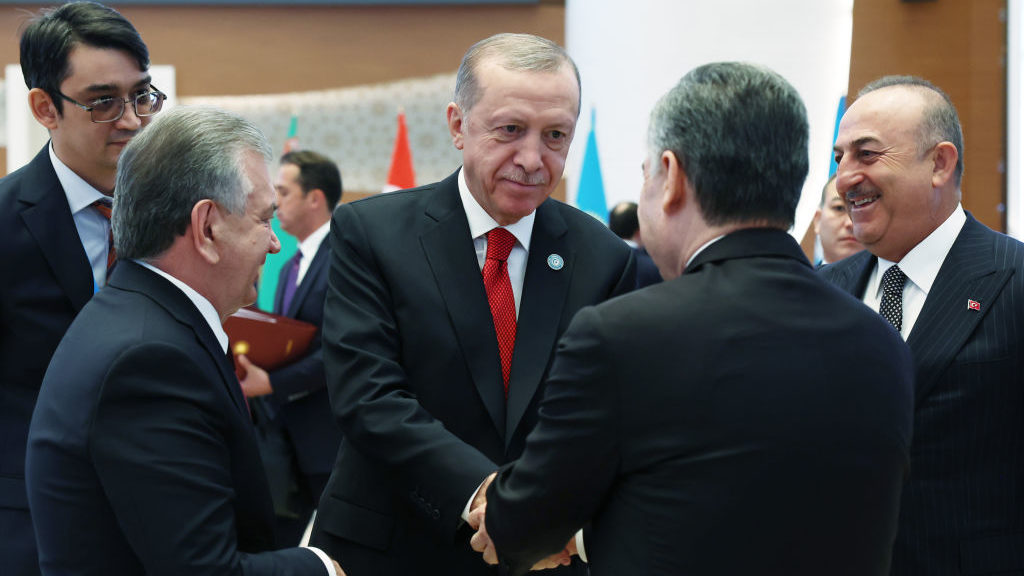Turkey Looks to Turkic Countries for Regional Clout
Ankara has been trying to boost cooperation with group of countries with deep historical and cultural ties
As Turkey aims to increase its global influence under President Recep Tayyip Erdoğan, it has honed in on one faction: the Turkic states, a group of countries in central and western Asia that share a similar language.
One iteration of this is a group with close ties to the Turkish government, the Organization of Turkic States, which includes Turkey, Kazakhstan, Azerbaijan, Uzbekistan, and Kyrgyzstan.
Zaur Gasimov, an expert on Turkey and the Caucasus at the University of Bonn, says that working together increases the Turkic countries’ influence in the region in the face of Russian and Iranian influence.
Gasimov adds that Russia’s war on Ukraine brought Turkey and the Turkic countries in the region closer.
While he cautions that it was not a watershed moment in relations, it is an important time that will influence present and future work on military and security cooperation.
“Russia’s war in Ukraine demonstrated to the entire post-Soviet space how fragile … statehood, political and economic independence in [the] post-imperial period [are].” Gasimov told The Media Line.
These markets are important for the Turkish military industry as well as for Turkish soft power due to linguistic, cultural and religious bonds
He said Russia’s war also has made Turkey a more attractive alternative to work with because of Moscow’s weakened position on the global stage and its partial mobilization of both Russian and foreign men, forcing them to fight against Ukraine.
Many Kyrghyz and Uzbeks live and work in Russia and have been called up for military service. In October, Uzbeks working in Russia reportedly asked their government for help after getting notices to show up for conscription.
“Turkey has been getting more and more attractive as one of the most popular places for education, medical treatment and investment for the upper middle class in all Turkic states, as well as – along with Russia – the main destination for [guest workers] from those countries,” Gasimov said.
Erdoğan has tried to decrease his country’s reliance on Western and NATO countries and shift some of its geopolitical weight and connections eastward.
There is a deep mistrust of the United States in Turkey, which was accelerated by the failed coup attempt in 2016.
Some in Turkey, including government officials, have claimed the US played a part in the putsch, without supporting evidence.
In the years since, the NATO country has moved closer to Russia, buying weapons that resulted in US sanctions.
Analysts say Erdoğan also attempted to become a global leader and defender of Muslims.
Increasing cooperation with countries that share historical roots, as well as similar languages and traditions, could also serve to increase the president’s image as leader on the world stage.
Gasimov says that Turkic countries view Turkey as an example to emulate when it comes to political and economic modernization, especially due to its soft power such as tourism and exported soap operas.
Reliance in the region goes both ways.
Turkey is a major exporter, meaning the countries are valuable markets for its struggling economy since they depend on the country for a variety of products, such as medicine.
The region also provides Turkey with energy.
“These markets are important for the Turkish military industry as well as for Turkish soft power due to linguistic, cultural, and religious bonds,” according to Gasimov.
Turkish Airlines, a major source of soft power for Ankara that increases Turkey’s profile internationally, also offers widespread service for the region.
Speaking at a trilateral summit with the leaders of Azerbaijan and Turkmenistan, which became an observer member of the Organization of Turkic States, Erdoğan stated that he wants to increase trade and transportation capabilities among countries in the region, pointing to the development of a rail line connecting Turkey to Azerbaijan, via Georgia.
He also stressed the importance of sending natural gas from Turkmenistan to the West, especially in light of the pandemic and Russia’s war on Ukraine.
“The coronavirus pandemic, as well as the war and regional instabilities, have reminded us of the importance of transportation in protecting supply chains, which has moved energy supply security to the top of the global agenda,” Erdoğan said, according to his office.
“The importance of energy security and source diversification for the entire world, particularly for Europe, has been understood once again,” he also said.
Turkmenistan is a major source of natural gas for the world but has not tapped into European markets, which are desperate for new sources of energy after being unable to rely on Russia following the full-scale invasion of Ukraine.
The Turkish state news agency reported that the three countries also agreed to increase cooperation with the Organization of Turkic States.
Aydin Sezer, an Ankara-based foreign policy analyst, says that groups such as the Organization of Turkic States have facilitated increased visits for civil servants of these countries, which may be the point of the group.
It could also sustain the hopes of people who support pan-Turkism, the idea that all Turkic states will one day become one country.
Following agreements to increase cooperation signed during the trilateral meeting between Turkey, Azerbaijan, and Turkmenistan, the head of the Organization of Turkic States called it “a major step forward in the process of unifying and strengthening the entire Turkic world,” and said it “will serve to reinforce the already robust collaboration between our truly fraternal nations,” Turkey’s state news agency reported.
Sezer says that Russia had been a source of limitation, due to its influence, on what Turkey could accomplish in the region, but Moscow now has accepted Ankara’s cooperation with countries.
Meanwhile, Turkey’s allies in the European Union and the US do not believe that Ankara’s actions have amounted to much, he adds.
“They realize that this initiative can only produce cultural results. Therefore, they are just watching,” Sezer told The Media Line.


